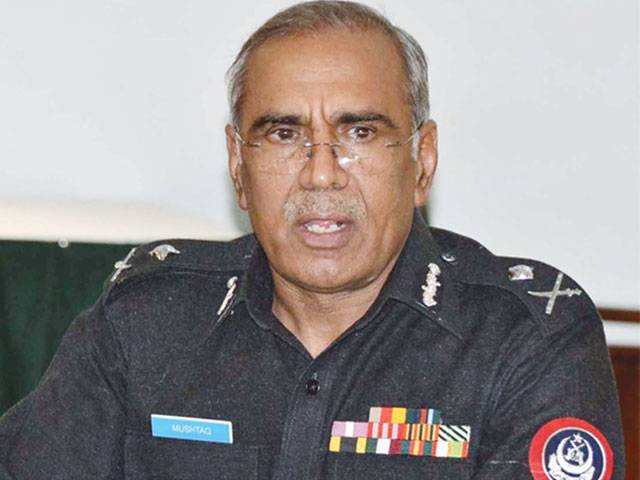LAHORE - On the orders of the newly-appointed Punjab Inspector General of Police (IGP), thousands of police commandoes escorting the influential persons and former and serving bureaucrats are directed to report back to police headquarters.
The cops deployed on the security of retired and serving police officers are also withdrawn as they are being deployed on operational duties across the province.
Elite police, the highly-trained wing of the police, was established to carryout special operations against the hardened criminals. “Every policeman deployed on protocol or service duty is being withdrawn. Punjab police are not a protocol force. We need to serve the public rather than serving the individuals,” the IGP confirmed.
During his first interview with any newspaper, Mushtaq Ahmed Sukhera discussed different security-related matters at length and also spelled out his priorities as chief of the country’s largest law enforcing agency.
Many retired and serving officers are cursing the provincial police chief for withdrawing police squads deployed at their official and private residences. Believe it or not, at least 25 policemen had been serving one retired police officer in Lahore, according to police sources. They had been working as cook, gardener, dispatcher or guard.
All have been taken back. At least 300 officials who were serving the retired or in-service officers as cook, sweeper, gardener, dispatcher or guard have already reported back the police headquarters while the others are asked to report before the July 12 deadline.
It was also learnt that the IGP’s initiative irked many bureaucrats as the police chief straightforwardly refused to entertain the political elite.
Currently, there are more than 5,700 personnel of the Punjab Elite Force out of which above 4,000 policemen are deployed to provide security to the influential persons and their families including the prime minister, chief minister, governor, senior judges, and powerful individuals. “I’ll go by the book. The police will provide security only to those who are entitled or they are facing terror threats. My top priority is to maintain law and order in the province,” said the IGP.
To a question about the Model Town tragedy, the police chief made it clear that the probe would be brought to logical end. “Police are not a party. It is an institution. We must trust and strengthen the institutions.” He went on to say, “If we start criticising the medical profession, where will we go in case of illness. The persons sitting at the helm of the affairs may be criticised but no one should try to destroy the institutions. Some political leaders talk about de-politicising police but unfortunately at the same time they are dragging police into politics just for point scoring, he explained.
Mushtaq Ahmed Sukhera, who survived two suicidal attacks during his posting as IGP in the restive Balochistan province, is regarded as a professional commander and terror fighter. But he wants freehand in the administrative affairs, particularly pertaining to postings. “It is up to the government,” the IGP said when asked whether he would be allowed to appoint district police officers (DPOs) and Regional Police Officer (RPOs) according to his choice and on merit. “When we talk about results, we must trust and respect the institutions,” he replied.
Usually, the Punjab chief minister himself shortlists and interviews every police officer before ordering the appointment as DPO and RPO. Many police officers consider such action as a direct interference into the police affairs while some political leaders say that the chief minister has the authority to pick right man for the right job.
Police are accused of massive corruption and the opposition political parties are condemning the government for its failure to bring the much-needed police reforms.
Responding to a question, the provincial police chief underlined that most of the reported rape cases are found to be of “mutual consent” rather than sexual assault. In many of the reported cases of rape and kidnapping, the police found that the victims had eloped with the accused but later they got registered criminal cases.
“If the police do not register a rape case, the force is taken to task in media. So, the police have to report false claims on the public complaints under duress. Therefore, the DNA test is made mandatory in every rape case in order to ensure transparent investigation and to bring the culprits to justice.
Last year, Punjab police revealed in its annual report that one female was sexually assaulted after every three hours and 40 minutes while one gang-rape incident occurred after every 45 hours and 38 minutes. Of 2,576 rape incidents reported in 2013, the victims in 167 cases were children. During the first five months of 2014, Punjab police reported more than 1,100 rape cases. The investigators cancelled as many as 192 rape cases as the allegations proved false during probe.
Tuesday, April 16, 2024
Elite to go without Elite police escort
| IGP Sukhera wants free hand in administrative affairs to clear mess | Says Model Town case to be investigated to logical end but politicians must trust institutions

Caption: Elite to go without Elite police escort
Decision to retaliate against Iran attacks rests with Israel, says Pentagon
1:05 PM | April 16, 2024
Global brands facing challenge from local contenders in Pakistan's FMCG market
10:24 AM | April 16, 2024
Israeli Air Force finalizes preparations for possible attack on Iran
8:21 AM | April 16, 2024
Court remands XEN in FIA custody
April 16, 2024
Political Reconciliation
April 16, 2024
Pricing Pressures
April 16, 2024
Western Hypocrisy
April 16, 2024
Policing Reforms
April 15, 2024
Storm Safety
April 15, 2024
Democratic harmony
April 16, 2024
Digital dilemma
April 16, 2024
Classroom crisis
April 16, 2024
Bridging gaps
April 16, 2024
Suicide awareness
April 15, 2024
ePaper - Nawaiwaqt
Advertisement
Nawaiwaqt Group | Copyright © 2024





